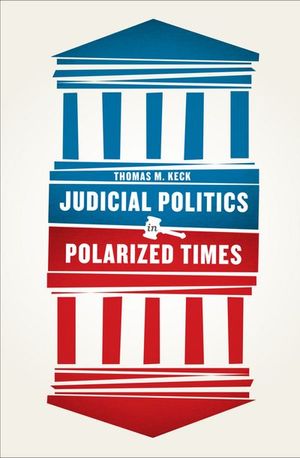Judicial Politics in Polarized Times
Published by The University of Chicago Press
This “important and timely discussion of judicial politics” sheds light on America’s courts as they rule on abortion, gay rights, gun rights, and more (Choice).
When the Supreme Court upheld the Affordable Care Act, some saw the decision as a textbook example of neutral judicial decision making, noting that a Republican Chief Justice joined the Court’s Democratic appointees in their vote. Others decried the decision as an example of partisan justice citing a Republican bloc of Court appointees who voted to strike the statute down. Still others argued that the ACA’s fate ultimately hinged not on the Court but on the outcome of the 2012 election. These interpretations reflect larger shifts in judicial politics that have emerged in today’s increasingly polarized America. Are judges neutral legal umpires, unaccountable partisan activists, or political actors whose decisions conform to—rather than challenge—the democratic will?
Drawing on a sweeping survey of hot-button litigation—on abortion, affirmative action, gay rights, and gun rights—across the Clinton, Bush, and Obama eras, Thomas M. Keck argues that, while each of these perspectives has merit, each is also misleading. Despite judges’ claims, actual legal decisions are not the politically neutral products of disembodied legal texts. But neither are judges “tyrants in robes,” undermining democratic values by imposing their own preferences. Just as often, judges and the public seem to be pushing in the same direction. As for the argument that the courts are powerless institutions, Keck shows that their decisions have profound political effects. And, while advocates on both the left and right use litigation to achieve their ends, neither side has consistently won. Ultimately, Keck argues, judges respond not simply as umpires, activists, or political actors, but in light of distinctive judicial values and practices.
When the Supreme Court upheld the Affordable Care Act, some saw the decision as a textbook example of neutral judicial decision making, noting that a Republican Chief Justice joined the Court’s Democratic appointees in their vote. Others decried the decision as an example of partisan justice citing a Republican bloc of Court appointees who voted to strike the statute down. Still others argued that the ACA’s fate ultimately hinged not on the Court but on the outcome of the 2012 election. These interpretations reflect larger shifts in judicial politics that have emerged in today’s increasingly polarized America. Are judges neutral legal umpires, unaccountable partisan activists, or political actors whose decisions conform to—rather than challenge—the democratic will?
Drawing on a sweeping survey of hot-button litigation—on abortion, affirmative action, gay rights, and gun rights—across the Clinton, Bush, and Obama eras, Thomas M. Keck argues that, while each of these perspectives has merit, each is also misleading. Despite judges’ claims, actual legal decisions are not the politically neutral products of disembodied legal texts. But neither are judges “tyrants in robes,” undermining democratic values by imposing their own preferences. Just as often, judges and the public seem to be pushing in the same direction. As for the argument that the courts are powerless institutions, Keck shows that their decisions have profound political effects. And, while advocates on both the left and right use litigation to achieve their ends, neither side has consistently won. Ultimately, Keck argues, judges respond not simply as umpires, activists, or political actors, but in light of distinctive judicial values and practices.
BUY NOW FROM
COMMUNITY REVIEWS
